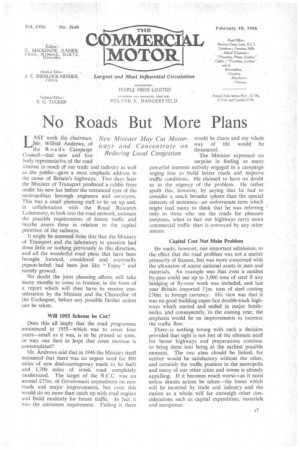No Roads But More Plans
Page 9

If you've noticed an error in this article please click here to report it so we can fix it.
Nev Minister May Cut Motorways and COncentrate on Reducing Local Congestion LAST week the chairman, Mr. Wilfrid Andrews, of • the Roads Campaign Council—that new and live body representative of the road interest in much of our trade and industry as well as the public—gave a most emphatic address in the cause of Britain's highways. Two days later the Minister of Transport produced a rabbit from under his new hat before the entranced eyes of the metropolitan borough engineers and surveyors. This was a small planning staff to be set up and, in collaboration with the Road Research Laboratory, to look into the road network, estimate the possible requirements of future traffic and maybe assess these in relation to the capital priorities of the railways.
it might be assumed from this that the Ministry of Transport and the laboratory in question had done little or nothing previously in this direction, and all the wonderful road plans that have been brought forward, considered and eventually pigeon-holed, had been just like " Topsy " and merely growed.
No doubt the joint planning efforts will take many months to come to fruition, in the form of a report which will then have to receive consideration by the Minister and the Chancellor of the Exchequer, before any possible further action can be taken.
Will 1955 Scheme he Cut?
Does this all imply that the road programme announced in 1955—which was to cover four years—small as it was, is to be pruned so soon, or may one dare to hope that some increase is contemplated?
Mr. Andrews said that in 1946 the Ministry itself estimated that there was an urgent need for 800 mites of new dual-carriageway roads to be built and 1,700 miles of trunk road completely modernized. The target of the R.C.C. was an annual £75m. of Government expenditure on new roads and major improvements, but even this would do no more than catch up with road neglect and build modestly for future traffic. In fact it was the minimum requirement Failing it there would be chaos and our whole way of life would be threatened.
The Minister expressed no surprise in finding so many powerful interests actively engaged in a campaign urging him to build better roads and improve traffic conditions. He claimed to have no doubt as to the urgency of the problem. He rather spoilt this, however, by saying that he had to consider a much broader sphere than the special interests of motorists—an unfortunate term which might lead many to think that he was referring only, to those who use the roads for pleasure purposes, when in fact our highways carry more commercial traffic than is conveyed by any other means.
Capital Cost Not Main Problem He made, however, one important admission, to the effect that the road problem was not a matter primarily of finance, but was more concerned with the allocation of scarce national assets in men and materials. An example was that even a modest by-pass could use up to 3,000 tons of steel if any bridging or fly-over work was included, and last year Britain imported I m. tons of steel costing £76m. in foreign currency. His view was that it was no good building super-fast double-track highways which started and ended in major bottlenecks, and consequently,In the coming year, the emphasis would be on improvements to increase the traffic flow.
There-is nothing wrong with such a decision provided that sight is not lost of the ultimate need for better highways and preparations continue to bring them into being at the earliest possible moment. The two aims should be linked, for neither would be satisfactory without the other, and certainly the traffic position in the metropolis and many of our other cities and towns is already appalling. If it becomes much worse—as it must unless drastic action be taken—the losses which will be incurred by trade and industry and the nation as a whole will far outweigh other considerations such as capital expenditure, materials and manpower.












































